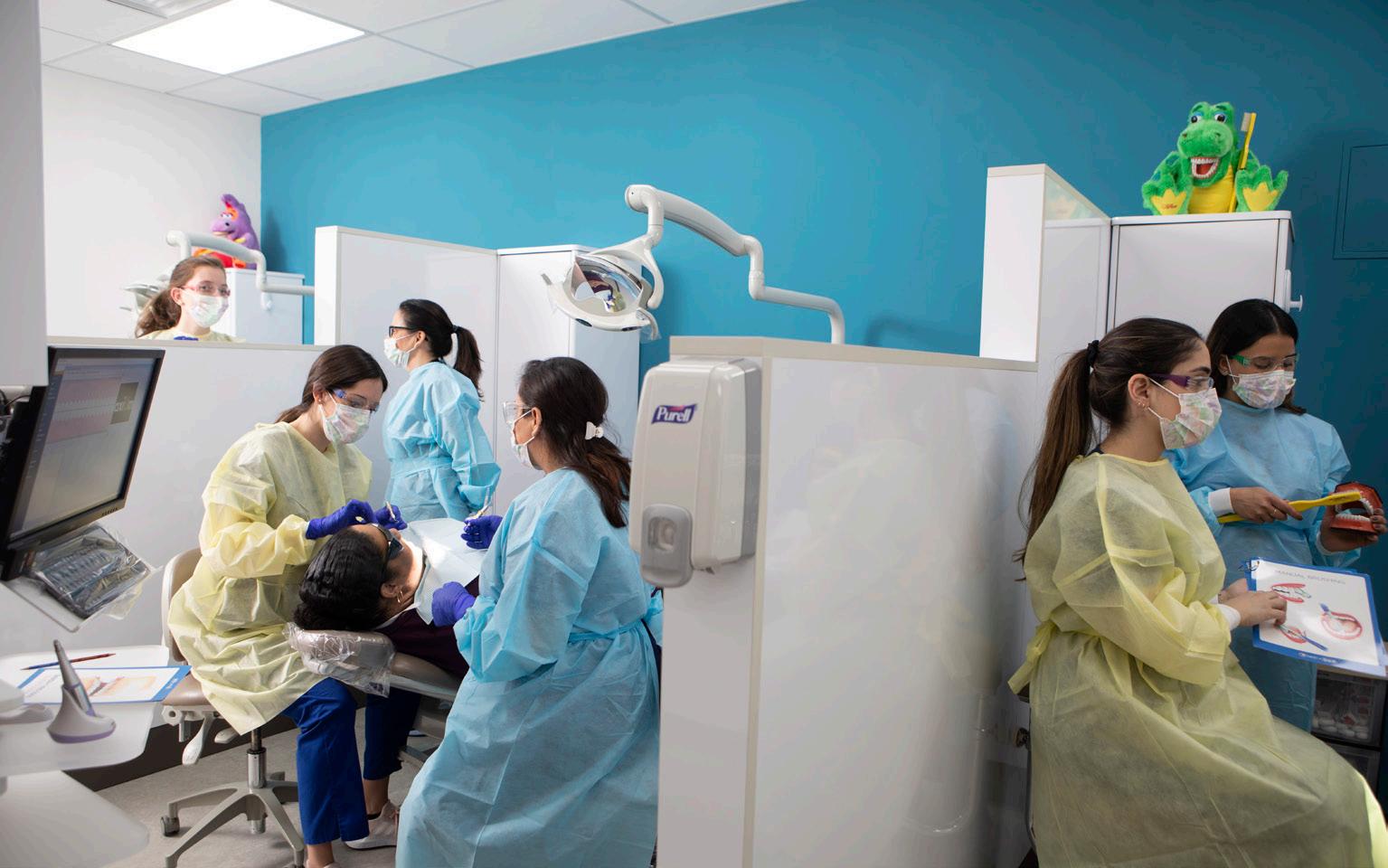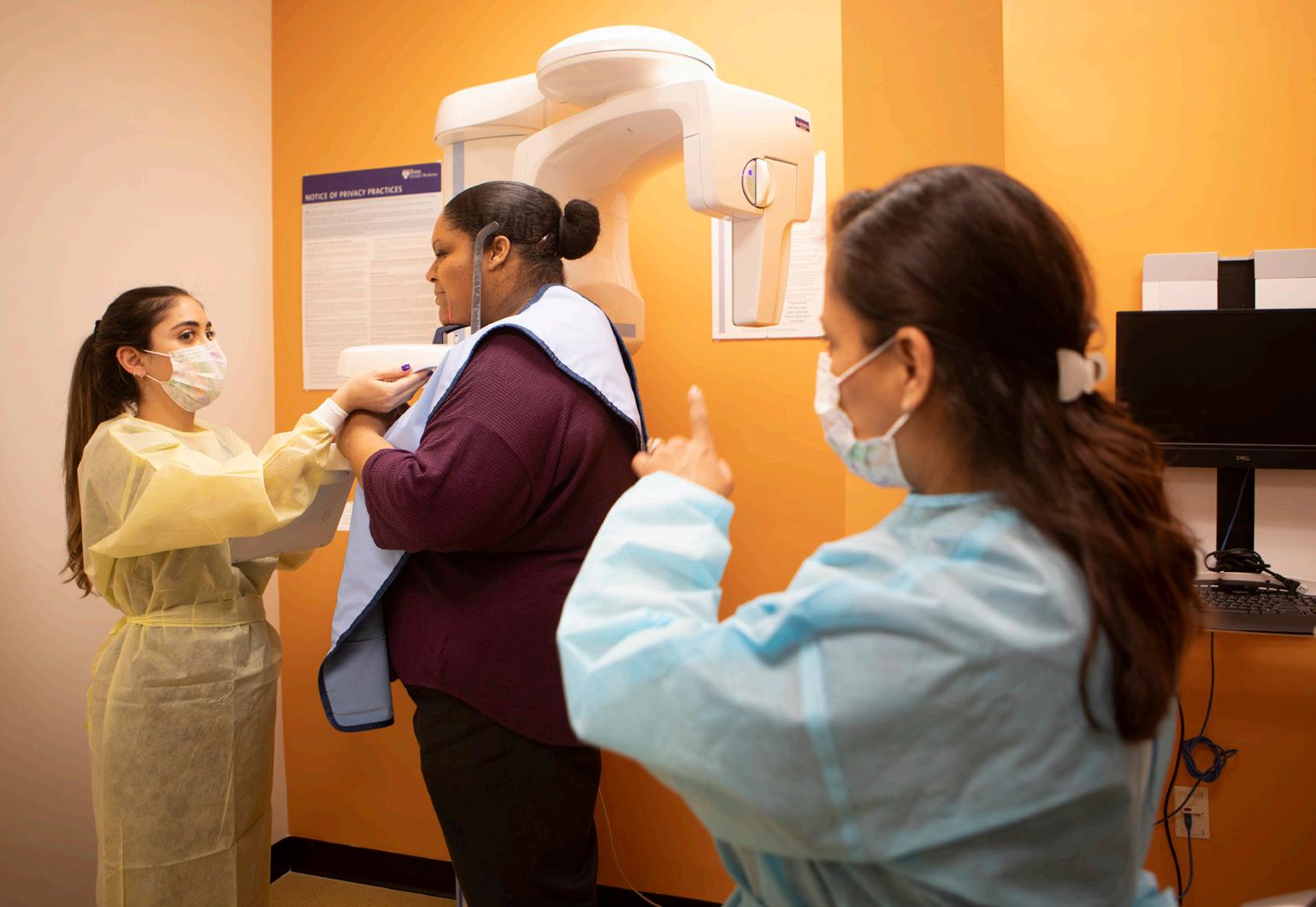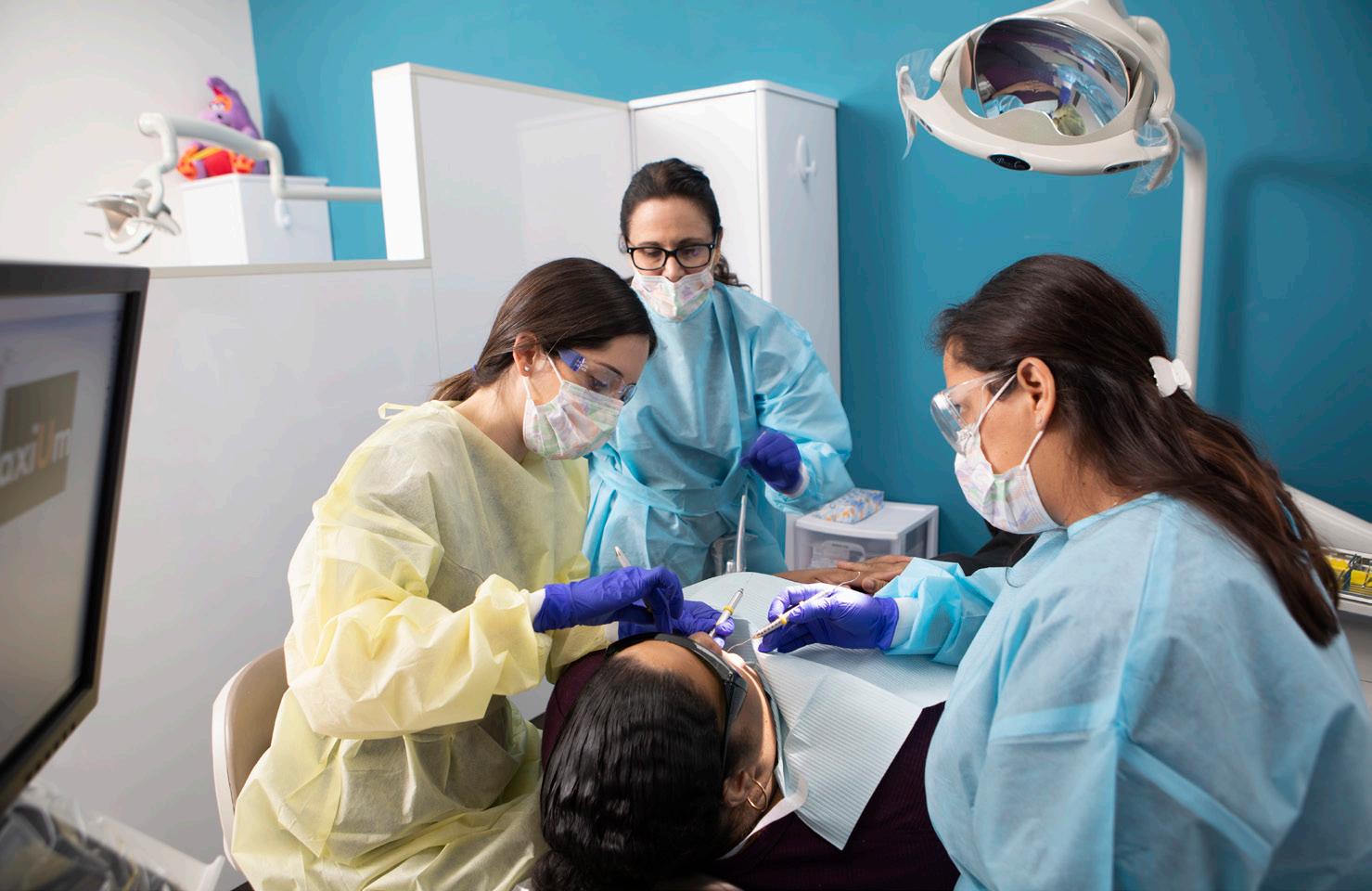
10 minute read
A SHARED VISION OF COMMUNITY HEALTH WITH A NEW DENTAL FACILITY WITHIN PUENTES DE SALUD, PENN DENTAL MEDICINE IS BRINGING MUCH-NEEDED CARE TO THE COMMUNITY
Since 2007, Penn Dental Medicine students and faculty have been providing education, oral health screening, and referral services at Puentes de Salud, a non-profit health center that serves a vibrant community of Latin American immigrants in and around South Philadelphia. With the recent opening of a full-time, on-site dental care center at Puentes de Salud, Penn Dental Medicine has taken on a significant role in the well-being of this community, many of whose members have limited access to dental care.
The three-seat Penn Dental Medicine at Puentes de Salud Dental Care Center is operated by Penn Dental Medicine faculty, staff, and third-and fourth-year dental students, who provide examinations and preventive and restorative dental care for patients of all ages. Faculty and students work with the Puentes de Salud health center staff to include oral health as an essential part of health care. Establishing a dental care center at Puentes de Salud embodies the missions of both the University and the School: to educate students to serve the public and contribute to the common good. It is another step in Penn Dental Medicine’s ongoing initiative to improve access to care while better understanding the needs of Philadelphia’s underrepresented communities.
“This is something that we’ve wanted for so long,” says Dr. Joan Gluch, Chief, Division of Community Oral Health, who estimates that the center will provide approximately 2,500 patient visits a year. “In the past, we educated and screened patients at Puentes de Salud and referred them for care at the School’s clinics. Now, we are bringing
“The new dental care center is the final piece of the plan,” says Dr. Steven Larson, Executive Director and Cofounder of Puentes de Salud and Associate Professor of Emergency Medicine at Penn’s Perelman School of Medicine. Dr. Larson started Puentes de Salud in 2006 in a church basement in South Philly, moving to 1840 South Street in 2010 and to a Penn-owned facility at 1700 South Street in 2015. (See the sidebar on Puentes de Salud on page 28.) “Having primary dental care available to our patients completes the model of community health that we have been building for decades.”
For Penn Dental Medicine Dean Mark Wolff, the opening of the center is a major achievement in delivering the kind of holistic care that has long been a cornerstone of Penn Dental Medicine. “We want our students to care for the whole patient, and understanding the community in which they live is part of achieving whole patient health,” he says.
“Meeting our patients where they are, in the communities where they live, work, and attend school, is what our mission is all about."
— DEAN MARK WOLFF
A SHARED VISION Though the architects of Puentes de Salud’s South Street home had roughed in an area for dental care, it had been used for storage since the building opened in 2015. Then, when Dean Wolff arrived at Penn Dental Medicine in 2018, “the planets aligned,” says Dr. Larson, who has partnered with Penn Dental Medicine since students first began providing preventive care at Puentes. At his first meeting with Dean Wolff, Dr. Larson remembers, the two men discovered a shared vision of community health. what our mission is all about. Our partnership with Puentes de Salud is helping us achieve that goal.”
A DRASTIC NEED FOR DENTAL CARE The Latino immigrant community has unusually complex dental issues, for a range of reasons: financial restrictions, lack of health insurance, lack of access to providers, a low level of trust in the medical profession, and fear of drawing attention to undocumented status. Most are used to going without even the most basic health care, including dental.

This lack of preventive care, paired with poor nutrition, is reflected in the mouths of patients at Puentes de Salud, says Lorena Garcia, the public health hygienist who runs the daily operations at the new dental center.
“Our students see patients with oral health conditions that they have never encountered,” she says. “Years without dental treatment have resulted in drastic levels of inflammation and broken-down teeth. Students are deeply touched when they realize that a simple extraction or debridement can make a huge difference in everyday lives, and that each case has huge importance.”
“I come from an immigrant family, so I know how frustrating and painful it is to have a family member with an untreated toothache,” adds Garcia, a fluent Spanish speaker who came to the U.S. from Colombia and grew up in New York City. “It’s important for us to gain the trust of this community so we can help them overcome these issues.”
In addition to treating advanced dental problems, the center’s first-line defense against disease and decay will always be preventive care and education.
A SAFE HAVEN Garcia explains that Penn Dental Medicine consulted with the engineers, architects, and designers of the space to ensure that the dental center is “a safe haven”: warm, welcoming, and comfortable, with soothing colors and an open, transparent feel. The center is outfitted with both new and gently used dental equipment from Penn Dental Medicine, and she is especially grateful for the panoramic radiograph machine, which provides an instant, comprehensive picture of each patient’s mouth.
The center also is equipped to provide chair-side translation for nearly any language through a portable system that enables on-screen interaction with a live translator. “Although 99.9% of our patients are native Spanish speakers, there are also Russian and Vietnamese families in the community we serve,” she says. “We want everyone to feel welcome.”
REAL-WORLD EXPERIENCE Garcia, a registered dental hygienist and public health dental hygiene practitioner, works closely with Dr. Gluch and Penn Dental Medicine faculty to oversee thirdand fourth-year students, each of whom will rotate through the center once a week for block rotations of six to ten weeks. Two other public health dental hygiene practitioners, Karoline Genung and Cynthia Gonzales, also work with dental students and patients to round out the Puentes de Salud team.
Community oral health honors students will spend even more time at Puentes throughout the year, working closely with faculty and training fellow students as they begin their rotations. This deep dive into community health is a window to a world rarely experienced by dental students, says Dr. Gluch, who coordinates the community honors program.
A RETURN TO CORE VALUES Current honors students value the program for many reasons. For Araxi Kalach Mirzoyan (D’21), who immigrated to the United States from Venezuela in 2015, the experience of those she serves at Puentes is strikingly familiar.
“When I moved to America, I was lost. I struggled to find health care for my needs being educated in oral hygiene can make in someone’s life,” she says. “We’ve given presentations at Puentes on topics such as how diabetes can affect oral health, and the audience has expressed how eye-opening it was for them. It’s gratifying when all of our hard work in dental school culminates in improving the health of people who wouldn’t otherwise get such good care.”
— ARAXI KALACH MIRZOYAN (D’21)
and that I could relate to, something close to the health care I got at home,” she remembers. “Being at Puentes, serving people who are often misunderstood and helping them get comfortable talking about their problems in their own language has been absolutely rewarding.”
Stefanie Kligman (D’21) has learned firsthand how education impacts community health. “It’s exciting to see what a difference
Herta Granado (D’21), a first-generation Hispanic college and professional school student, values the opportunity to step outside the boundaries of the School and immerse herself in a community in need.
“It’s very easy to get caught up in the clinical aspects of dentistry as a student,” she says. “Being at Puentes takes us back to one of the core values of our profession: to provide dental education and preventive care


— CRISTINA SANCHEZ (D’22)
to populations. It’s a consistent reminder that our impact extends beyond a single filling or cleaning — it is our ability to approach individuals who may not know where to begin in regard to their dental care that is truly fulfilling.”
As a Cuban-American from Miami, Fla., Cristina Sanchez (D’22) feels that working at Puentes has diversified her dental and professional experience. “It has allowed me to strengthen my Spanish-speaking skills in a dental setting and better understand the barriers to care that exist in our society. These are things that can’t be taught in a classroom,” she says. “I feel honored to be able to serve the Latino immigrant population and improve their access to care.”
A POWERFUL TOOL For all students, Puentes exemplifies a successful model of health care based on a truly multidisciplinary community—one where professionals and volunteers come together to solve problems and improve the quality of their patients’ lives.
For Garcia, students are a key component of a committed team—one whose unified purpose has made the dental care center at Puentes a sustainable reality.
— By Juliana Delany
Puentes de Salud: Compassionate, Culturally Appropriate Care
The idea for Puentes de Salud (which means “health bridges” in Spanish) took root in Kennett Square, Pa., in the 1990s, when Dr. Steven Larson, an emergency room physician at the Hospital of the University of Pennsylvania, learned about the dire need for health care among immigrants who came to the Chester County town for agricultural jobs. “Caring for immigrants just felt right,” says Dr. Larson, whose grandparents came to the U.S. from Puerto Rico. With the mentorship of Peggy Harris, a family nurse practitioner in Chester County, he began working at a small, all-volunteer medical clinic that served immigrant farm workers, most of whom hailed from the same village in Mexico.
As friends and family members of this group continued to arrive in the City of Brotherly Love for restaurant and domestic jobs, settling in South Philly, Dr. Larson moved his volunteer practice into the basement of St. Agnes Church on South Broad Street. The practice partnered with local nonprofits and the School District of Philadelphia to include not only medicine, but social, legal, and educational services as well. With the help of promotoras, community health educators trained to engage with their neighbors on important medical issues, Puentes has fundamentally changed the health landscape for this community.
Today, Puentes de Salud, now located in 7,000 square feet at 1700 South Street, provides primary health care and associated services for nearly 9,000 patients, most from Mexico but also from other Latin American countries and beyond. Its staff, many of whom speak Spanish fluently, is 98 percent volunteer. Patients pay just $20 for basic office visits. To sustain Puentes, Dr. Larson fundraises continuously, reaching out to people and organizations across the city for resources and skills. “When you don’t have money, the way that you grow is to collaborate,” he says. “Everyone is invited to the table. We are rich in volunteers and partners from all disciplines whose expertise strengthens the fabric of Puentes.”



